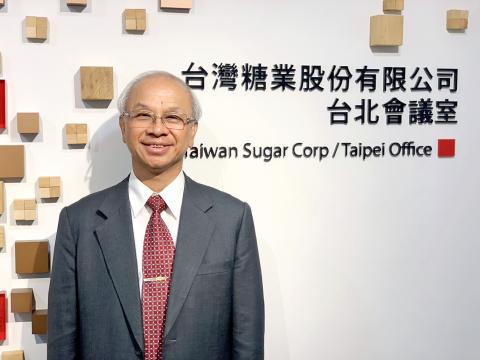Taiwan Sugar Corp (Taisugar, 台糖) yesterday unveiled hog farm renovation plans and two other projects that embrace a circular economy business model, saying it aims to have renewable energy sources provide an installed capacity of 1.3 gigawatts by 2025.
“Most of the electricity would be generated by solar power,” Taisugar chairman Chen Chao-yih (陳昭義) told a news conference in Taipei.
“We would install solar panels on top of the renovated hog farms, in detention basins and on infertile land,” Chen said.

Photo: Lin Ching-hua, Taipei Times
Taisugar has more than 500 hectares of infertile land suitable for solar farming, but the Council of Agriculture would need to approve its plans, Chen said.
Apart from solar energy, the renovated hog farms would also use pig slurry to provide renewable energy, said Wen Yuan-wen (溫元文), deputy chief executive officer of Taisugar’s livestock division.
“We would treat about 200 tonnes of hog waste per day, which would allow us to generate about 7,000 kilowatt-hours of power per day,” Wen said.
The state-run company said it spent NT$688 million (US$22 million) on its first hog farm in Pingtung County’s Changjhih Township (長治), which is currently being tested.
It is planning to renovate another 16 hog farms at an estimated cost of NT$10.7 billion over the next three years.
“We have been given the green light by local authorities for four hog farms in Yunlin County and Tainan,” Chen said, adding that another seven hog farms are still awaiting approval from the Pingtung County and Taichung governments.
Taisugar is also looking at incorporating environmentally friendly elements into its land development business.
It began work on a “circular village” last year near Tainan’s Shalun Smart Energy Science City (沙崙智慧綠能科學城).
The village is to house about 350 families, with accommodation ranging from studios to three-room apartments, said Chen Kuan-han (陳冠翰), deputy director of Taisugar’s Department of Land Development.
Furniture and appliances would be rented out to tenants, Chen Kuan-han said, adding that this would encourage the project’s suppliers to design products with a longer life cycle.
Taisugar also plans to recycle used oyster shells by turning them into calcium carbonate, which can be used in building materials.
It aims to provide an estimated 40,000 tonnes of calcium carbonate per year to local construction companies, the company said, adding that it is also working with the Industrial Technology Research Institute (工研院) to make calcium supplements from oyster shells.

To many, Tatu City on the outskirts of Nairobi looks like a success. The first city entirely built by a private company to be operational in east Africa, with about 25,000 people living and working there, it accounts for about two-thirds of all foreign investment in Kenya. Its low-tax status has attracted more than 100 businesses including Heineken, coffee brand Dormans, and the biggest call-center and cold-chain transport firms in the region. However, to some local politicians, Tatu City has looked more like a target for extortion. A parade of governors have demanded land worth millions of dollars in exchange

An Indonesian animated movie is smashing regional box office records and could be set for wider success as it prepares to open beyond the Southeast Asian archipelago’s silver screens. Jumbo — a film based on the adventures of main character, Don, a large orphaned Indonesian boy facing bullying at school — last month became the highest-grossing Southeast Asian animated film, raking in more than US$8 million. Released at the end of March to coincide with the Eid holidays after the Islamic fasting month of Ramadan, the movie has hit 8 million ticket sales, the third-highest in Indonesian cinema history, Film

Taiwan Semiconductor Manufacturing Co’s (TSMC, 台積電) revenue jumped 48 percent last month, underscoring how electronics firms scrambled to acquire essential components before global tariffs took effect. The main chipmaker for Apple Inc and Nvidia Corp reported monthly sales of NT$349.6 billion (US$11.6 billion). That compares with the average analysts’ estimate for a 38 percent rise in second-quarter revenue. US President Donald Trump’s trade war is prompting economists to retool GDP forecasts worldwide, casting doubt over the outlook for everything from iPhone demand to computing and datacenter construction. However, TSMC — a barometer for global tech spending given its central role in the

Alchip Technologies Ltd (世芯), an application-specific integrated circuit (ASIC) designer specializing in server chips, expects revenue to decline this year due to sagging demand for 5-nanometer artificial intelligence (AI) chips from a North America-based major customer, a company executive said yesterday. That would be the first contraction in revenue for Alchip as it has been enjoying strong revenue growth over the past few years, benefiting from cloud-service providers’ moves to reduce dependence on Nvidia Corp’s expensive AI chips by building their own AI accelerator by outsourcing chip design. The 5-nanometer chip was supposed to be a new growth engine as the lifecycle